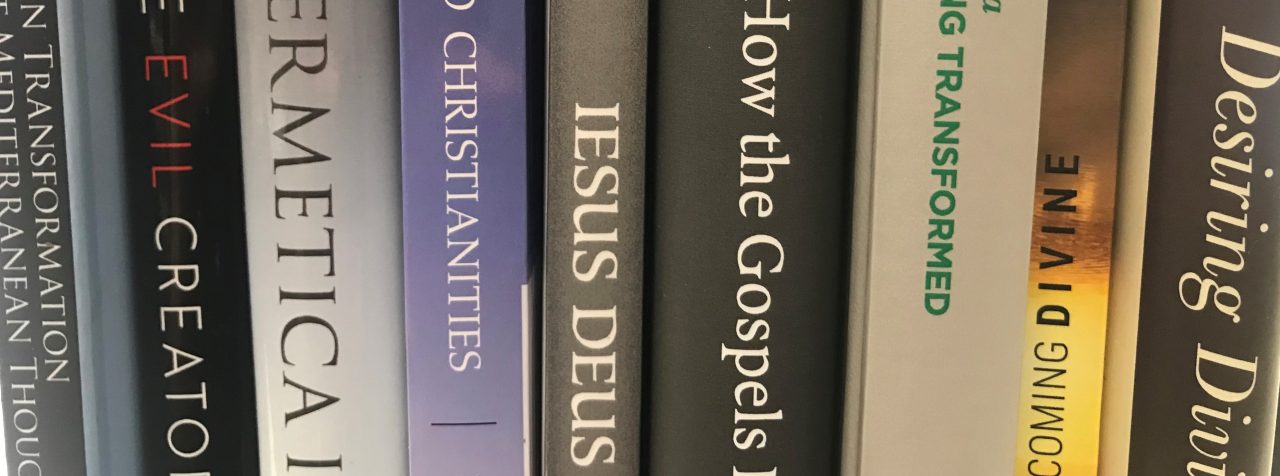
ENDORSEMENTS:
Adela Yarbro Collins: “This book is of interest to a wide readership. It will help historical critics understand what “divinity” meant in the ancient world. It will also help theologians understand the origins of Christology. I recommend it to students, scholars, and any reader curious about Jesus.”
Stanley Stowers: “M. David Litwa’s Iesus Deus marks a major breakthrough in scholarship on early Christianity. The book manages to overcome the scholarly apologetic segregation of early Christian beliefs about Jesus Christ from Greek and Roman dominated Mediterranean culture and to demonstrate the fit of these beliefs in that Hellenistic context. A great deal of writing about the ‘purely Jewish’ Christ crumbles with this book.”
David Aune: “In Iesus Deus, M. David Litwa surveys six of the more significant ways in which early Christians from the first through the third centuries CE drew on common reservoir of ancient Mediterranean conceptions of deity as models for expressing the ultimate significance of Jesus, namely his divine origin and deity. These six themes include divine conception (focusing on Luke 1), punitive protection of honor (Jesus as the enfant terrible of the Infancy Gospel of Thomas), superhuman moral benefaction (Origen’s argumentation in the Contra Celsum), epiphanic or theophanic manifestation (the Gospel transfiguration narratives), corporeal immortalization (the Gospel resurrection accounts), and the reception of a proper divine name (Phil 2:9-11 in the light of Roman imperial practice). This is an extraordinarily well-written, nuanced, convincingly argued and methodologically sophisticated comparative study which breaks new ground in understanding a centrally important aspect of the formation of early Christology. The author rightly criticizes the continued tendency to bifurcate “Judaism” and “Hellenism,” and in his use of comparative method rejects superficial conceptions of “borrowing” by appealing to the shared existence of an “embedded Hellenization” that pervaded ancient Mediterranean cultures. The author makes use of an impressive array of primary and secondary sources over which he has enviable control. This book gets four stars and should be required reading for all serious students of early Christian thought.”
TABLE OF CONTENTS
Introduction: The “Deification” of Jesus Christ
Chapter 1: “Not through Semen, Surely”: Luke and Plutarch on Divine Birth
Chapter 2: “From Where Was this Child Born?”: Divine Children and the Infancy Gospel of Thomas
Chapter 3: “Deus est iuvare”: Miracles, Morals, and Euergetism in Origen’s Contra Celsum
Chapter 4: “And he was Metamorphosed”: Transfiguration as Epiphany
Chapter 5: “We Worship One who Rose from His Tomb”: Resurrection and Deification
Chapter 6: “The Name Above Every Name”: Jesus and Greco-Roman Theonymy
BECOMING DIVINE: An Introduction to Deification in Western Culture

This book was originally accepted for publication by SUNY Press, but I offered it to Wipf & Stock (Cascade imprint) because I felt that they could distribute it to a wider audience. Written in an accessible style, is designed for the general reader and for classroom use. Chapter 3 (on Paul) provides a summary of my longer (2012) study called We Are Being Transformed. I post a brief description of the whole book below, then a table of contents, and after it the pdf version of the cover, which includes the endorsements.
BRIEF DESCRIPTION
“Some have called it the essence of sin, others the depth of salvation. Regardless of one’s evaluation of it, however, deification throughout Western history has been a part of human aspiration. From the ancient pharaohs to modern transhumanists, people have envisioned their own divinity. These visionaries include not only history’s greatest megalomaniacs, but also mystics, sages, apostles, prophets, magicians, bishops, philosophers, atheists and monks. Some aimed for independent deity, others realized their eternal union with God. Some anticipated godhood in heaven, others walked as gods on earth. Some accepted divinity by grace, others achieved it by their own will to power. There is no single form of deification (indeed, deification is as manifold as the human conception of God), but the many types are united by a set of interlocking themes: achieving immortality, wielding superhuman power, being filled with supernatural knowledge or love—and through these means transcending normal human (or at least “earthly”) nature.”
TABLE OF CONTENTS
Chapter 1: Merging with the Sun: The Deification of Amenhotep III
Chapter 2: The New Dionysus: Divine Assimilation in the Greco-Roman Ruler Cult
Chapter 3: “You Have Been Born a God”: Deification in the Orphic Gold Tablets
Chapter 4: “We are Being Transformed”: Paul and the Gospel of Deification
Chapter 5: “Immortalized in This Very Hour”: Deification in the “Mithras Liturgy”
Chapter 6: “I Have Been Born in Mind!”: Deification in the Hermetic Literature
Chapter 7: “I Have Become Identical With the Divine”: Plotinus on Deification
Chapter 8: “The Flash of One Tremulous Glance”: Augustine and Deification
Chapter 9: “I Am the Truth”: The Deification of Husayn ibn Mansur al-Hallaj
Chapter 10: “God’s Being is My Life”: Meister Eckhart’s Birth in God
Chapter 11: “Uncreated by Grace”: Deification in Gregory Palamas
Chapter 12: “By Faith a Human Becomes God”: Martin Luther on Deification
Chapter 13: “Then They Shall be Gods …”: The Mormon Restoration of Deification
Chapter 14: “Rather be a God Oneself!” Nietzsche and the Joy of Earthly Godhood
Chapter 15: The Posthuman God
